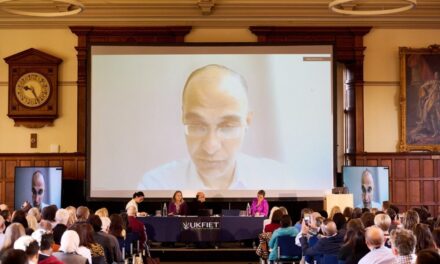This blog was written after the UKFIET September 2025 conference by the theme convenors of ‘Equitable partnerships and cross-cultural collaboration’, one of seven conference themes: Rhona Brown (Lecturer in Education, University of Glasgow) and Amy Lightfoot (Academic Director, English and School Education, British Council).
There is much to reflect on from the Equitable partnerships and cross-cultural collaboration sub-theme at the 2025 UKFIET conference. The framing of the whole conference recognised that it is now more important than ever to find ways to collaborate meaningfully and to form partnerships equitably, especially in response to the human-created climate and environment crisis, and humanitarian and democratic crises. In our original call for papers, we asked presenters to dig deeper into the human solutions that we need and the ways in which partnerships can and should move us forward – as well as to reflect on the ways that no longer serve us.
More widely in education and development discourses, we have noticed a creeping increase in the language of ‘co-ownership’, ‘co-development’ and ‘co-creation’, which is not always accompanied with the ‘co-labouring’ of collaboration – the emotionally and time demanding sticky and complex issues at the heart of any partnership. However, we were heartened by the UKFIET presentations which really did take a deep dive into this complexity and examined the specific characteristics, or the ‘architecture’ of more equitable partnerships and collaboration.
In terms of new ways of thinking about partnerships, we explored the importance of interrogating the nature of the ‘private’ in public-private partnerships and of not seeing PPPs as “neutral policy tools”. As well as recognising the need for different kinds of evidence for different purposes, we were also asked to critically assess different kinds of partnership for different purposes and the importance of this for evidence uptake. Several papers looked at alternative ways of doing partnerships, shifting the focus from making a problematic power dynamic ‘less bad’ to changing the way of working. For example, addressing the gaps between research, practice and policy through building research capacity in the South or through dynamic Research Policy Collaboratives.
What also came across very strongly was the need to address the power imbalances and injustices that have been knitted into many partnership models. While decolonising approaches and practices are fundamental to this, several speakers also called for us to ‘move beyond binaries’ and simplistic categorisations, for example, of North-South partnerships, or Western and non-Western knowledge production and mobilisation, and instead to take relational approaches that require us to re-examine power, privilege and the reproduction of knowledge hierarchies at all levels. This was also accompanied by a call for reparative partnerships, which recognise the damage which has already been done, with the global North perpetuating inequities in knowledge production. This left us with the actionable insight that we can all re-examine which knowledges and practices should be prioritised to inform new education and research as we move forward.
As well as being a rich forum for discussion and learning, we also felt that this year’s conference was one of the most intense and confronting conferences we had been to. It seems more important than ever that we are able to find ways to ‘hold space’ – to find ways to sit together, with our differences, our different priorities and different approaches, and really find ways to work together across those as we are buffeted from all sides by the goings-on in the wider world. Committing to holding together as a community and finding constructive ways to challenge but also collaborate is key. It struck us what a fantastic forum and community UKFIET provides for this, in terms of who it gets into the room together, but also reminded us of the need to continue this spirit in between the conferences and find ways to reach out and connect, including with those we might not previously have approached. After all, we are all working towards the same goals and with shared motivations for doing so. Aren’t we?



